by Kim Plummer Krull
Every week Mike Permenter drove 45 minutes to the Nelson Children’s Center in Denton, Texas, to join 14-year-old Tim for checkers, Battleship, and other board games that, Permenter says, “would make my own kids roll their eyes.”
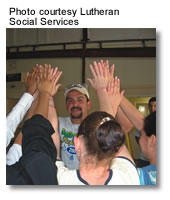 The mentor and young teen tackled “no heavy spiritual discussions” during their time together at the Lutheran Social Services (LSS) residential treatment center for children with behavioral and emotional problems caused by severe neglect and abuse. But over the months, Permenter was pleased to see Tim gradually become “a happier, shoulders-back, chest-out guy.”
The mentor and young teen tackled “no heavy spiritual discussions” during their time together at the Lutheran Social Services (LSS) residential treatment center for children with behavioral and emotional problems caused by severe neglect and abuse. But over the months, Permenter was pleased to see Tim gradually become “a happier, shoulders-back, chest-out guy.”
This spring, just before Tim (whose name has been changed to protect his privacy) moved from Nelson into a foster home, the youngster received God’s gifts in Christ through Baptism. His mentor signed Tim’s baptismal card.
“These are the most front-line spiritual consequences I have ever been involved with,” said Permenter, a member of St. Peter Lutheran Church, Roanoke, about Nelson’s spiritual-care program. “It’s not those board games that matter so much. For these kids, it’s the validation that someone cares.”
The Nelson Center’s voluntary spiritual-care program is one example of what LSS President and CEO Dr. Kurt Senske calls “the value added” in the help, healing, and hope offered to troubled youngsters.
“This is what makes us unique from almost every other children’s center in Texas,” Senske said. “Over the years, our experience has shown us, and we deeply believe, that no child can be truly healed unless he is cared for emotionally, physically, and spiritually.”
A total of 165 children are served daily at Nelson and LSS’ two other residential treatment centers in Texas—Krause (in Katy) and New Life (in Canyon Lake). Their ages range from six to 17. Most have been removed from their homes because of physical, emotional, or sexual abuse, often at the hands of once-trusted adults. Because of that abuse, each child struggles with low self-esteem, anger, or other behavioral and emotional problems—wounds that hurt long after bones and bruises have healed.
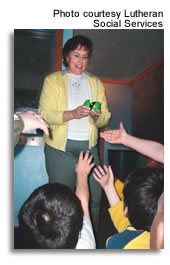 In 2006, LCMS World Relief and Human Care provided a $30,000 seed grant for deaconesses to serve as spiritual-care directors at the treatment centers. Since then, “Miss Ruth” (Deaconess Ruth Drum at Nelson) and “Miss April” (Deaconess April Bishop at Krause) have guided spiritual care that goes hand in hand with physical, emotional, and educational therapies. Typically, the deaconesses are among the first staff members young residents get to know as a person who cares about them.
In 2006, LCMS World Relief and Human Care provided a $30,000 seed grant for deaconesses to serve as spiritual-care directors at the treatment centers. Since then, “Miss Ruth” (Deaconess Ruth Drum at Nelson) and “Miss April” (Deaconess April Bishop at Krause) have guided spiritual care that goes hand in hand with physical, emotional, and educational therapies. Typically, the deaconesses are among the first staff members young residents get to know as a person who cares about them.
“The children are usually pretty quick to come to us, whether they need someone to listen or to tell them whom to go to for something they need, like clothing,” said Bishop. “Many times, they just want someone to tell how scared and hurt they are.”
As they get acquainted, the deaconesses inform youngsters about spiritual-care opportunities—e.g., youth groups, Bible studies, chapel services. Participation is voluntary, but most children are drawn to at least one activity.
Even those who reject invitations to Bible study or youth groups seek the spiritual-care directors for one-on-ones that can be heart-wrenching.
“These kids are filled with bad memories and anxiety,” Drum said. “In our conversations, we look for opportunities to share God’s unconditional love, and for them to learn they are God’s dearly beloved children. We try to give them hope, helping them know that someone bigger and stronger really does love them.”
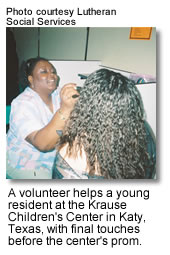 As a longtime volunteer and Bible-study leader at Krause, Art Thomas has seen young lives touched by God’s Word. One of the most remarkable, he says, was Marsha, a teen who called her parents devil worshipers.
As a longtime volunteer and Bible-study leader at Krause, Art Thomas has seen young lives touched by God’s Word. One of the most remarkable, he says, was Marsha, a teen who called her parents devil worshipers.
Marsha (whose name also is changed for privacy reasons) initially ignored Thomas when he invited her to his weekly Bible study. “She was very bitter, but, finally, she agreed to have a cookie with us,” said Thomas, a member of Memorial Lutheran Church, Katy. Eventually, he says, Marsha became a Bible-study regular who seriously studied Scripture.
As she prepared to leave Krause around age 18, Marsha asked her Bible-study teacher to pray for an opportunity that would allow her to live independently and look for a job. “She said she knew she could never go back to her parents,” Thomas said.
Like Art Thomas, many volunteers who lead Bible lessons, serve as mentors and prayer pals, and plan holiday parties, are members of area Lutheran churches. They serve children who may not always seem appreciative, Drum says. But the time and attention of caring Christians does make a difference.
“The kids are smart enough to know that I get paid to be here, but these volunteers are not getting paid and don’t have to be here,” Drum said. “That makes a big difference.”
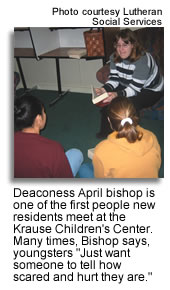 Each treatment center strives to equip children to deal with their painful pasts, change destructive behaviors, and successfully transition into new homes—foster, adoptive, or, sometimes, with their own families. Spiritual care provides an opportunity to learn about one life-changing tool—God’s love.
Each treatment center strives to equip children to deal with their painful pasts, change destructive behaviors, and successfully transition into new homes—foster, adoptive, or, sometimes, with their own families. Spiritual care provides an opportunity to learn about one life-changing tool—God’s love.
Echoing an expression used by Permenter, Senske speaks of “front lines” when he describes the opportunity to touch the souls of youngsters who, in most cases, come from dysfunctional, unchurched homes. “When we talk about reaching out through Ablaze!, few probably think about these children,” he said. “But April and Ruth are on the front lines of sharing the Good News of Jesus.”
About a year ago, three young boys who had become friends at Nelson asked to be baptized together. Drum recalls praying with the boys in the chapel and sensing how they, like so many children at the center, seemed to crave “these sacred times and places that are so wonderful for their souls and minds.”
The deaconess admits that most days a visitor would note few signs of spiritual transformations. But she believes that staff and volunteers who provide spiritual care plant seeds of faith.
Permenter says he watched those seeds grow in Tim. Considering the teen’s troubled past, he should be “on the streets, on drugs, or even dead by now,” Permenter said. Instead, when Tim left the Nelson Center for a foster home, his former mentor says he had no doubt the youngster was better equipped for life today—and for eternity.
Two Ways to Share Healing and Hope
More than half the children who leave the Nelson and Krause children’s centers transition into foster homes. To ensure their healing and hope continues, Christian foster families are urgently needed.
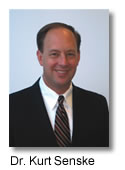 Noting that May is “Foster Care Month,” LSS President and CEO Dr. Kurt Senske says the demand for foster families is greater than ever. About 650 LSS foster families now serve some 940 children in foster homes in Texas.
Noting that May is “Foster Care Month,” LSS President and CEO Dr. Kurt Senske says the demand for foster families is greater than ever. About 650 LSS foster families now serve some 940 children in foster homes in Texas.
Another big need: financial support. Because laws forbid state funds to cover the cost of spiritual-care programs, LSS depends on generous donors to fund opportunities to share God’s love with hurting, mostly unchurched youngsters.
To learn more about foster care, giving opportunities, or other ways you can help children in the name of Jesus through LSS, please visit www.lsss.org or call (800) 938-5777.





